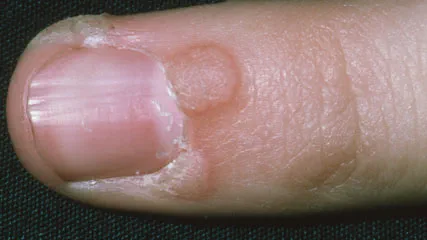10 wart and verruca facts
In this article we will describe 10 facts about warts and verrucas. It is mainly written for health professionals.

Typical warts
Key Points
- Warts and verrucas are caused by a virus called Human Papillomavirus (HPV)
-
They can occur anywhere on the body, but warts are often on the fingers, and verrucas are specifically found on the soles of the feet
-
Diagnosis is usually clinical, with confirmation via dermoscopy or biopsy if necessary
-
Treatment options include watchful waiting (they usually go away on their own eventually), topical treatments, cryotherapy, and surgical removal
-
Prevention involves avoiding skin-to-skin contact and maintaining good foot hygiene.
1. Definition
- Warts and verrucas are benign growths caused by the Human Papillomavirus (HPV).
- Verrucas are specifically warts that occur on the soles of the feet.
Types
There are several types of warts, including:
-
Common warts (verruca vulgaris): typically found on hands and fingers
-
Plantar warts (verruca plantaris): found on the soles of the feet
-
Flat warts (verruca plana): typically found on face, arms, and legs
-
Genital warts (condyloma acuminatum): found on genital and perianal areas
-
Mosaic warts: multiple small warts clustered together
2. Epidemiology
-
Warts are common, affecting up to 20% of schoolchildren and 10% of adults
-
Verrucas affect up to 10% of the general population
-
Warts are more common in individuals with weakened immune systems.
3. Risk Factors
-
Skin-to-skin contact with an infected individual
-
Sharing personal items (e.g. towels, socks)
-
Walking barefoot in public areas
-
Weakened immune system (e.g. HIV, immunosuppressive therapy)
-
Certain occupations (e.g. healthcare workers, athletes)
4. Causes
- Warts and verrucas are caused by the Human Papillomavirus (HPV).
- There are over 100 strains of HPV, with certain strains more commonly associated with specific types of warts.
5. Symptoms
-
Warts are small, rough, or smooth growths on the skin
- Warts may be usually flesh-coloured, but can be white, pink, or brown

Typical verrucas
- Verrucas may cause pain or discomfort, especially when pressure is applied
-
Surrounding skin may become calloused or inflamed
6. Diagnosis
- Diagnosis is typically clinical, based on visual examination. Dermoscopy or biopsy may be used to confirm diagnosis if necessary.
Investigation
This is not normally needed.
-
Dermoscopy: to examine the lesion in detail
-
Biopsy: to confirm diagnosis or rule out other conditions
-
HPV typing: not typically necessary for diagnosis, but may be used in research or specific cases.
Differential Diagnosis
-
Calluses or corns
-
Moles or melanoma
-
Seborrhoeic keratoses
-
Skin tags
-
Molluscum contagiosum.
7. Treatment
-
Watchful waiting: most warts resolve spontaneously within 2 years
-
Topical treatments: salicylic acid, cryotherapy, or imiquimod cream
-
Cryotherapy: liquid nitrogen to freeze the wart
-
Surgical removal: curettage or excision
-
Laser therapy: for persistent or multiple warts
When to see a doctor
-
If you experience pain or discomfort
-
If you have a weakened immune system
-
If you notice changes in the size, shape, or colour of the wart
-
If you have difficulty walking due to a verruca.
8. Complications
-
Persistent or recurrent warts
-
Spread to other areas of the body
-
Transmission to others
-
Scarring or skin pigmentation changes
9. Prognosis
-
Most warts resolve spontaneously within 2 years
-
Treatment can be effective, but recurrence is possible
-
Some warts may persist or require ongoing treatment.
10. Prevention
-
Avoid skin-to-skin contact with infected individuals
-
Wear shoes in public areas (e.g. swimming pools, gyms)
-
Maintain good foot hygiene
-
Avoid sharing personal items
-
Consider using condoms to reduce transmission of genital warts.
Summary
We have described 10 facts about warts and verrucas. We hope it has been helpful.
Other resources
What does the skin do? (7 functions)
Review article: Aboud, 2023
Top Tip – Warts and verrucas
If you wait long enough, most warts and verrucas will go away.

